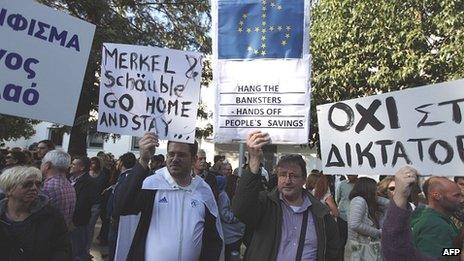Cyprus bailout: Who messed up?
- Published
- comments

Cypriots feel their country is facing a diktat from German and EU officials
Almost nobody now believes the Cypriot bailout deal negotiated in the early hours of Saturday morning was smart.
As the economist Paul Krugman put it, it was as if Europeans were holding up a sign which read "time to stage a run on your bank". In Europe's corridors of power there is the sound and sight of officials pointing fingers and rowing back from previous positions held.
Here's the reality: Cyprus's banks will remain closed at least until Thursday while they try and unravel this. The Cypriot parliament may delay again today voting on a bailout deal that has brought protesters onto the streets. Bank shares in Europe have been under pressure. The markets are unnerved. Fear has returned to the eurozone. The EU's reputation has been damaged.
Not a good day's work.
So what's happening? After a conference call on Monday, Europe's finance ministers said that small savers, who were going to be taxed at 6.5%, should be protected.
A new proposal from the finance ministry has surfaced today. The aim is to better protect the small savers. Under the plan those with savings less than 20,000 euros would pay nothing. Those with deposits between 20,000 and 100,000 would pay a one-off levy of 6.75%. Savings above 100,000 would face a 9.9% tax.
The proposal leaves in doubt whether it could raise the nearly 6bn euros that was a central part of the bailout deal.
And in a further indication of just how complicated this could become, the Cypriot Central Bank Governor Panicos Demetriades said he expected that 10% of deposits would be withdrawn when banks finally open.
The Cypriot government appears to have decided against raising the levy on those with deposits of more than 100,000 euros to over 15%.
Here's the rub: The government fears this would effectively destroy its financial sector. Those wealthy Russians, who are the largest foreign investors, are likely to pull their funds out of the island if the one-off tax is too high. The Russians are angry and the Cypriot finance minister is heading to Moscow to explain.
On verge of bankruptcy
The Cypriots argue that the bailout would end up undermining a key sector of the economy. The suspicion in Nicosia is that it is precisely what countries like Germany want. They don't like tax havens for the wealthy.
So how did Europe get itself into this tangle? As always Germany is the starting point. For Chancellor Angela Merkel there was a moral element to this. "Anyone having their money in Cypriot banks," she said, "must contribute to the Cypriot bailout". In other words it can't just be left to the taxpayers of other countries.
The Cypriots say that the German Finance Minister Wolfgang Schaeuble was a strong proponent of taxing savers. At the talks the IMF also played tough. It insisted that Cypriot debt had to be sustainable and that meant reducing the size of the debt. So depositors were lined up to take a "haircut" - a slice from their savings.
The Cypriots tried to hold out but they were faced with a veiled threat. The European Central Bank (ECB) might stop providing funds to Cyprus's two major banks. Without support, the banks would collapse and bankruptcy would follow.
When the protests started, Mr Schaeuble tried to distance himself from what had been decided in Brussels. He told German TV that it was the European Commission and the ECB that had "decided on this solution and must explain that to the Cypriot people". The Cypriots say it was the Germans who had pushed hard for the levy on depositors. Berlin says "yes" but not on small depositors.
The arguments, no doubt, will continue. The legacy of this will be harder to forget.
Domino effect?
A suspicion will linger in places like Italy and Spain that, although European officials insist this was a one-off deal, depositors elsewhere might face a tax on their accounts.
There will also be the suspicion that the finance ministers were willing to undermine the Europe-wide deposit insurance scheme with a sleight of hand.
The episode also underlines again how much resentment is building in southern Europe towards the north and Germany in particular. Many of the protesters in Nicosia are openly antagonistic towards Angela Merkel and Berlin.
There will be a question whether - as with previous bailouts - the measures adopted will damage the very economy they are intended to save.
Cyprus reminds Europe how dangerous the eurozone crisis remains.